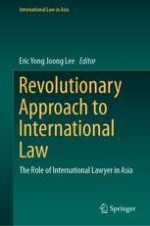2023 | OriginalPaper | Buchkapitel
3. The Past, Present, and Future of Investor-State Arbitration in East Asia
verfasst von : Dae Un Hong, Ju Yoen Lee
Erschienen in: Revolutionary Approach to International Law
Verlag: Springer Nature Singapore
Aktivieren Sie unsere intelligente Suche, um passende Fachinhalte oder Patente zu finden.
Wählen Sie Textabschnitte aus um mit Künstlicher Intelligenz passenden Patente zu finden. powered by
Markieren Sie Textabschnitte, um KI-gestützt weitere passende Inhalte zu finden. powered by
